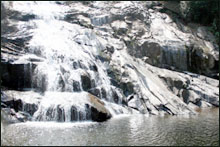South Africa gets ready to host GEO Ministerial Summit in Cape Town
|
Following the three previous Earth Observation Summits held in
Washington, DC in 2003, Tokyo in 2004, and Brussels in 2005, it is now
Africa's turn to host this very important event.
On 30 November 2007, five years after the World Summit on Sustainable Development (WSSD), ministers will gather in Cape Town, South Africa to take stock of the progress toward establishing a Global Earth Observation System of Systems (GEOSS). The GEO Ministerial Summit will be hosted by the Department of Science and Technology (DST), a co-chair of GEO, the intergovernmental Group on Earth Observations.
The Summit will allow participating nations to:
-
Report to Ministers on the early progress made in the implementation of the GEOSS and against the GEO 10-Year Implementation Plan;
-
Bring emerging priorities to the attention of the Ministers;
-
Engage the commitment of Ministers to endorse the Declaration of Cape Town
GEO was established in 2005 to support the implementation of a GEOSS. GEO includes 71 member countries, the European Commission, and 46 participating organizations.
The vision for the GEOSS is to realise a future wherein decisions and actions for the benefit of humankind are informed by coordinated, comprehensive and sustained Earth observations and information. Consistently, GEO has initiated a series of actions to improve monitoring of the state of the Earth, increase understanding of Earth processes, and enhance prediction of the behaviour of the Earth system.
Understanding the Earth system is crucial to enhancing human health, safety and welfare, alleviating human suffering including poverty, protecting the global environment, reducing disaster losses, and achieving sustainable development. Observations of the Earth system are critical to advancing this understanding.
The goal of GEOSS is to achieve comprehensive, coordinated, and sustained observations of the Earth system to improve monitoring of the changing state of the planet, increase understanding of complex Earth processes, and enhance the prediction of the impacts of environmental change. GEOSS will meet the need for all nations to benefit from access to timely, quantitative, and high-quality long-term global data and information as a basis for sound decision making, and will enhance delivery of benefits to society in the following areas:
-
Disasters - Reducing loss of life and property from natural and human-induced disasters;
-
Human Health - Understanding environmental factors affecting human health and well-being;
-
Energy Management - Improving management of energy resources;
-
Climate Variability and Change - Understanding, assessing, predicting, mitigating, and adapting to climate variability and change;
-
Water Cycle - Improving water resource management through better understanding of the water cycle;
-
Weather - Improving weather information, forecasting, and warning;
-
Protection of Ecosystems - Improving the management and protection of terrestrial, coastal, and marine resources;
-
Agriculture - Supporting sustainable agriculture and combating desertification;
-
Conserving Biodiversity - Understanding, monitoring, and conserving biodiversity.
GEOSS is substantially contributing to the United Nations Millennium Development Goals, including those mitigating poverty, hunger and disease. GEOSS will build on and add value to existing Earth-observation systems by coordinating their efforts, addressing critical gaps, supporting their interoperability, sharing information, reaching a common understanding of user requirements, and improving delivery of information to users.
Summit exhibition
SAEON will be participating in the multi-national exhibition that will be on display during the GEO Plenary Meeting preceding the Summit (28-29 November) and during the Summit on 30 November.
For more information on GEO, please click here and visit: www.earthobservations.org












